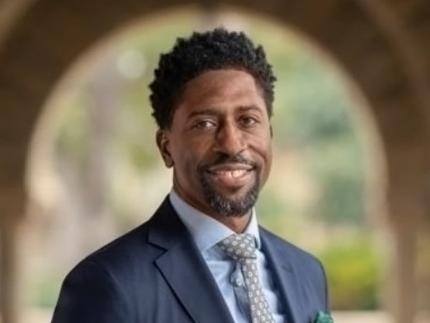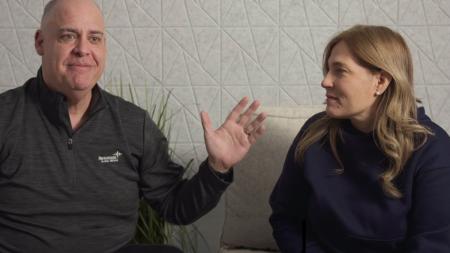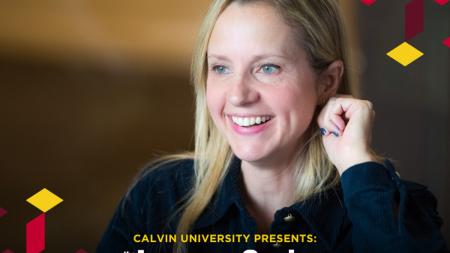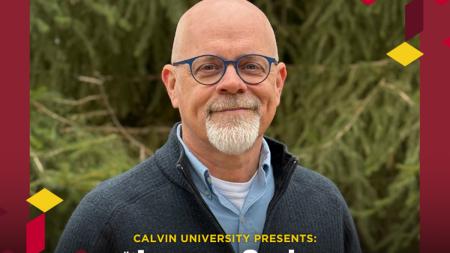Martin Luther King, Jr.: ‘OK, I Will’

Lerone Martin, an associate professor of religious studies at Stanford University and an award-winning author, kicked off Calvin University’s January Series 2024 on Monday, Jan. 15, with a presentation appropriately focused, he said, on Dr. Martin Luther King, Jr.
In coming days the annual mid-day series, which takes place at Calvin’s Covenant Fine Arts Center and is available through streaming and at some 45 remote sites around the world, will tackle subjects ranging from religious liberty to poverty and from medical ethics to artificial intelligence.
As he began his talk, titled “Soul Force: The Challenge of Martin Luther King,” Lerone Martin said he was honored to be given the chance to begin the series—which runs weekdays through Feb. 2 —with a discussion on King, whose life and legacy is celebrated with a United States national holiday every year on the third Monday in January.
“Today is that day. And for the last several years, Martin Luther King has been celebrated across all 50 states. He is a national hero,” said Martin, who is also the Martin Luther King, Jr., centennial chair and director of the Martin Luther King, Jr., Research and Education Institute at Stanford.
Although King is revered as a hero today, he was not always viewed very favorably, said Martin. “During his own time, there were those who called him, among other things, ‘backward’ and ‘footloose.’ They narrowed and muzzled his message, indicating that all he wanted was for everyone to get along,” Martin explained.
As his talking points flashed on a large screen, Martin sought to make clear that King’s emphasis was not solely on eradicating racism in America. The Baptist preacher, who had grown up in Atlanta, Ga., also worked to address and dismantle the scourge of poverty in the U.S., and he spoke out against and struggled to rein in America’s deadly approach to solving its problems, at home and abroad, through military and forceful means.
“King fought against those evil triplets – racism, poverty, and militarism,” said the January Series speaker. “Even though he was criticized for it, his approach was always Christian. He was first and foremost a preacher, a pastor.”
In his theology and approach, King began from the bedrock notion of imago Dei, the teaching that all people bear the stamp, the image of God, said Martin.
“King believed that every human being mattered, no matter their color or ethnicity or economic station in life. Everyone is valuable because they reflect the image of God.”
Because we are God’s people, said Martin, we are all joined by a sacred bond, indicating that racism and its ramifications are sinful. At the same time, King taught that poverty is also a result of sin because it separates those who have plenty from those who have very little.
On the matter of poverty, Martin commented: “There is nothing inherently evil about wealth, but you should never see yourself as better than a poor man because of your wealth. It is about what you do with your wealth.”
As for militarism, said Martin, King made clear that it is also sinful because it is about the use of violence, about wiping God’s imagebearers, in whatever places for whatever reasons, from the face of the earth.
While addressing this issue in the mid-1960s, King especially ran into the buzzsaw of popular dissatisfaction and ultimately disgrace, said Martin. And when he spoke out against the war in Vietnam and berated the reality of police brutality on the nation’s streets, many people in mainstream society turned against him, calling him a traitor and even a communist.
Through dozens of speeches and sermons and by organizing and leading protest actions based on nonviolence, King sought to shed light on and attempted to abolish, as best he could, any or all of these three evils, said Martin. Although he made progress, King was jailed many times and assailed in the press and elsewhere for his own human failures. “King was human and had his own moral and personal struggles,” Martin said.
In his most recent book, The Gospel of J. Edgar Hoover, Martin highlights the ways in which the FBI hounded and vilified King through wiretaps, false letters, and even collusion with some well-known church leaders of the day.
“The FBI tried to convince America that King wasn’t really following the gospel of Jesus Christ, that he was working for foreign powers,” said Martin.
Despite the efforts to demean his work, said Martin, King was committed, as a serious Christian, to battle the three evils—and, as it has become abundantly and lamentably clear, he was only partially successful.
Martin thus called on his listeners, as they marked the day of King’s birth and heart-filled work and ministry, to learn more about these issues and to seek to become agents of change.
In fact, Martin recalled the last words that King spoke before he was assassinated on the balcony of the Lorraine Motel in Memphis, Tenn., April 4, 1968. “King,” said Martin, “had just gotten word that an injunction had been lifted, and they were going to be able to engage in another march in Memphis.” And someone there said to King that it was going to be cold that night and that he would need to grab a coat.
“King’s last words were, ‘OK, I will,’ and then he was taken from us,” said Martin.
Martin then urged his listeners to commit themselves, as King did, to challenging racism, poverty, war, and violence by likewise saying, “OK, I will.”


